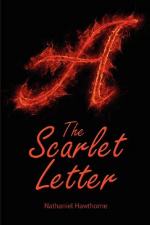It seemed, at this point, as if the minister must leave the remainder of his secret undisclosed. But he fought back the bodily weakness—and, still more, the faintness of heart—that was striving for the mastery with him. He threw off all assistance, and stepped passionately forward a pace before the woman and the children.
“It was on him!” he continued, with a kind of fierceness; so determined was he to speak out the whole. “God’s eye beheld it! The angels were for ever pointing at it! (The Devil knew it well, and fretted it continually with the touch of his burning finger!) But he hid it cunningly from men, and walked among you with the mien of a spirit, mournful, because so pure in a sinful world!—and sad, because he missed his heavenly kindred! Now, at the death-hour, he stands up before you! He bids you look again at Hester’s scarlet letter! He tells you, that, with all its mysterious horror, it is but the shadow of what he bears on his own breast, and that even this, his own red stigma, is no more than the type of what has seared his inmost heart! Stand any here that question God’s judgment on a sinner! Behold! Behold, a dreadful witness of it!”
With a convulsive motion, he tore away the ministerial band from before his breast. It was revealed! But it were irreverent to describe that revelation. For an instant, the gaze of the horror-stricken multitude was concentrated on the ghastly miracle; while the minister stood, with a flush of triumph in his face, as one who, in the crisis of acutest pain, had won a victory. Then, down he sank upon the scaffold! Hester partly raised him, and supported his head against her bosom. Old Roger Chillingworth knelt down beside him, with a blank, dull countenance, out of which the life seemed to have departed.
“Thou hast escaped me!” he repeated more than once. “Thou hast escaped me!”
“May God forgive thee!” said the minister. “Thou, too, hast deeply sinned!”
He withdrew his dying eyes from the old man, and fixed them on the woman and the child.
“My little Pearl,” said he, feebly and there was a sweet and gentle smile over his face, as of a spirit sinking into deep repose; nay, now that the burden was removed, it seemed almost as if he would be sportive with the child—“dear little Pearl, wilt thou kiss me now? Thou wouldst not, yonder, in the forest! But now thou wilt?”
Pearl kissed his lips. A spell was broken. The great scene of grief, in which the wild infant bore a part had developed all her sympathies; and as her tears fell upon her father’s cheek, they were the pledge that she would grow up amid human joy and sorrow, nor forever do battle with the world, but be a woman in it. Towards her mother, too, Pearl’s errand as a messenger of anguish was fulfilled.
“Hester,” said the clergyman, “farewell!”
“Shall we not meet again?” whispered she, bending her face down close to his. “Shall we not spend our immortal life together? Surely, surely, we have ransomed one another, with all this woe! Thou lookest far into eternity, with those bright dying eyes! Then tell me what thou seest!”




